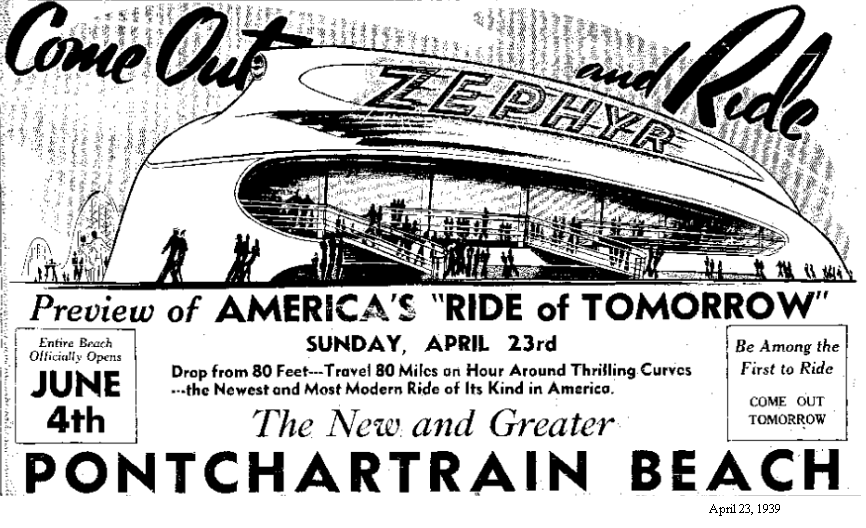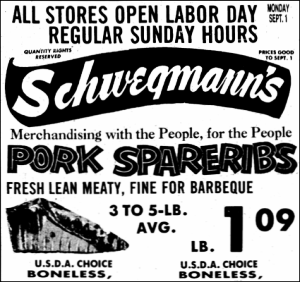|
Today in New Orleans History |
|
|
April 29


 Irbin
Pailet, with one horse and a wagon in 1920 built an ice and soft-drink empire. Pailet is pictured here in the office of
Jefferson Bottling Company at Metairie Road and Frisco Avenue in 1922 with his brother-in-law H. J. Wallick, director of sales
and brother Maurice, president. A 1927 advertisement for the business which operated at 716 Frisco Avenue noted that Jefferson Beverages
offered "All Flavors" including root beer, cider, sweet mandarin, and grape "Manufactured in a Most Modern
Up-To-Date Sanitary Plant -- Louisiana State Board of Health Inspection Scores 100 Per Cent". It was owned by Pailet
Industries which also operated the Marada Stock Farms at the same location. The family business also
included Metairie Ridge Ice Company and The Metairie Ridge Ice Company at 308 North Labarre Road and employed sister Fannie
and brothers Morris and Samuel Pailet Jr. In this 1926 photo Irbin is right of center (wearing a bow tie). When the Hi-Way Baseball Park opened on Sunday, July 10, 1927 on Jefferson
Highway at Harlem Avenue (now Causeway Boulevard) Jefferson Bottling Works began sponsoring a team (and would continue to
do so for many years). The first game played at the new park pitted the Shrewsbury Athletic Club against Eiriatem ("Metairie"
spelled backwards, the team was made up of Metairie High School students) followed by the Jefferson White Sox against Jefferson
Bottling Works in a double header. The park's grandstand seated 1000 spectators. On April 29,
In 1928 Irbin announced the purchase of the Orange Crush bottling company at 3500 Tulane Avenue and renamed it Jefferson Orange
Crush Bottling Company, Inc. Pailet said that the plant would have the capacity to produce 4,000 cans daily which would
be transported via 15 delivery trucks. The company also expanded their Metaire bottling location and managed Metairie Ridge
Coal Company. In 1938 the Pailets introduced Big Shot Root Beer. (D.C. “Infrogmation” May.)
and Tom Collins Jr (labled "The Life of the Party) -- a "lithiated lemon" drink in a double portion bottle
as well as Double Cola. The company began running promotions that same year. The first offered a free silver plated
spoon (valued at $1.50 per dozen) for every 12 bottle caps delivered to the plant off Metairie Road. The second, in
conjunction with Big Shot's roll-out offered cash prizes; winners were announced on WDSU radio three times daily. Round the Clock Ice The company pioneered 24 hour service via coin operated
machines. This 1949 advertisement shows that Pailet's business had expanded to include Claiborne Ice Company at 2816
South Claiborne Avenue (between Washington and Toledano), Arctic Pure Ice Company at 3701 Bienville Street (between Conti
and North Jefferson Davis Parkway), Riverside Ice Company at 2731 Chartres Street (between Port and St. Ferdinand), American
Ice Company at 2801 St. Philip Street (corner of North White), and The City Ice House at 3535 Tulane Avenue (between South
Genois and South Clark). After theCity Ice House closed, Dr. Momus Alexander Morgus used it for his laboratory beginning
on January 3, 1959. In an Interview with Morgus, the question was asked, "What brought you to locate your laboratory above the Old City Ice House?". Morgus
replied, "When refrigerators and store-bagged ice cubes took over the market years ago, many ice houses closed down,
leaving some excellent equipment behind that was ideal for freezing scientific specimens for my experiments - and, of course,
the rent was cheap." In 1960, on the company's 40th anniversary the local paper reported that
Pailet Industries was “one of the states' and city's largest tax-payers...using raw materials principally from Louisiana
resources“. In 1961, Jefferson Bottling introduced Chocolate Soldier to the Greater
New Orleans Area. Two 72-case processors at the company plant cooked the tasty beverage in the bottle and more than
20 trucks delivered it to local stores. The product was such a success that production manager Buddy Massett, who had
been with the company for over 30 years (and at one time had a tavern on Metairie Road) , added a Saturday working shift.
The bottling company operated on Frisco street in Old Metairie
until the 1980s before moving to 4951 River Road. Big Shot is now manufactured by National Beverage Corporation in Harahan.
 

To receive an update for each day in New Orleans
history, join our facebook page
- Today in New Orleans History
"How ya like dem erstuhs, Mister President?" Franklin Delano Roosevelt enjoys a post-luncheon smoke at Antoine's using his
well-known cigarette holder. The man in the bow tie behind the President is Roy Alciatore, the proprietor of Antoine's.
Photograph by Earl S. Martin. [E. S. Martin Photograph Collection] President Franklin Delano Roosevelt visited the Crescent
City on April 29, 1937. He came to dedicate the Roosevelt Mall in City Park near the city's new municipal
stadium, then under construction . The mall and the stadium, along with other improvements to the Park, were projects of
the Works Progress Administration (WPA), one of the keystones of FDR's New Deal. The President arrived in New Orleans by
train following a journey from Washington through Atlanta and on to the Alabama and Mississippi Gulf Coast. Also pictured
are Governor Richard Leche (on Roosevelt's right) and Mayor Robert S. Maistri (left of the presidient). At this luncheon,
Maistri allegedly asked "How ya like dem erstuhs, Mister President?" Photo from the New Orleans Public Library.
|
|
|

To receive an update for each day in New Orleans history,
join our facebook page - Today in New
Orleans History.
Analytics |








